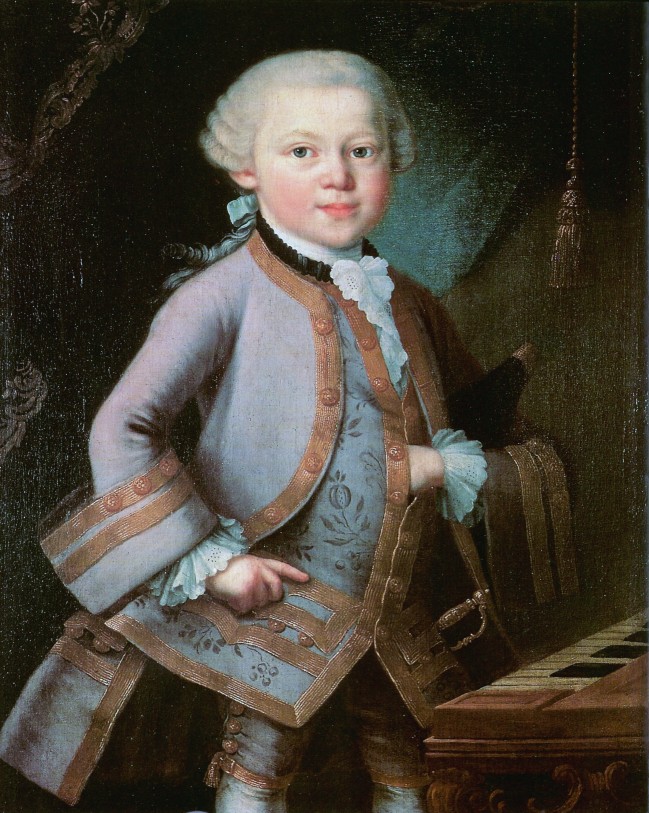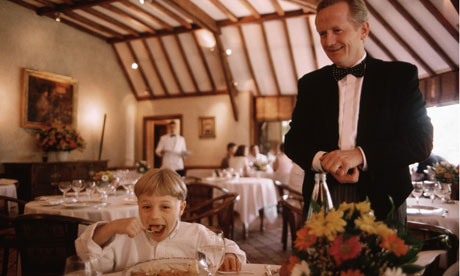
[div class=attrib]From the New York Times:[end-div]
Drew Petersen didn’t speak until he was 3½, but his mother, Sue, never believed he was slow. When he was 18 months old, in 1994, she was reading to him and skipped a word, whereupon Drew reached over and pointed to the missing word on the page. Drew didn’t produce much sound at that stage, but he already cared about it deeply. “Church bells would elicit a big response,” Sue told me. “Birdsong would stop him in his tracks.”
Sue, who learned piano as a child, taught Drew the basics on an old upright, and he became fascinated by sheet music. “He needed to decode it,” Sue said. “So I had to recall what little I remembered, which was the treble clef.” As Drew told me, “It was like learning 13 letters of the alphabet and then trying to read books.” He figured out the bass clef on his own, and when he began formal lessons at 5, his teacher said he could skip the first six months’ worth of material. Within the year, Drew was performing Beethoven sonatas at the recital hall at Carnegie Hall. “I thought it was delightful,” Sue said, “but I also thought we shouldn’t take it too seriously. He was just a little boy.”
On his way to kindergarten one day, Drew asked his mother, “Can I just stay home so I can learn something?” Sue was at a loss. “He was reading textbooks this big, and they’re in class holding up a blowup M,” she said. Drew, who is now 18, said: “At first, it felt lonely. Then you accept that, yes, you’re different from everyone else, but people will be your friends anyway.” Drew’s parents moved him to a private school. They bought him a new piano, because he announced at 7 that their upright lacked dynamic contrast. “It cost more money than we’d ever paid for anything except a down payment on a house,” Sue said. When Drew was 14, he discovered a home-school program created by Harvard; when I met him two years ago, he was 16, studying at the Manhattan School of Music and halfway to a Harvard bachelor’s degree.
Prodigies are able to function at an advanced adult level in some domain before age 12. “Prodigy” derives from the Latin “prodigium,” a monster that violates the natural order. These children have differences so evident as to resemble a birth defect, and it was in that context that I came to investigate them. Having spent 10 years researching a book about children whose experiences differ radically from those of their parents and the world around them, I found that stigmatized differences — having Down syndrome, autism or deafness; being a dwarf or being transgender — are often clouds with silver linings. Families grappling with these apparent problems may find profound meaning, even beauty, in them. Prodigiousness, conversely, looks from a distance like silver, but it comes with banks of clouds; genius can be as bewildering and hazardous as a disability. Despite the past century’s breakthroughs in psychology and neuroscience, prodigiousness and genius are as little understood as autism. “Genius is an abnormality, and can signal other abnormalities,” says Veda Kaplinsky of Juilliard, perhaps the world’s pre-eminent teacher of young pianists. “Many gifted kids have A.D.D. or O.C.D. or Asperger’s. When the parents are confronted with two sides of a kid, they’re so quick to acknowledge the positive, the talented, the exceptional; they are often in denial over everything else.”
We live in ambitious times. You need only to go through the New York preschool application process, as I recently did for my son, to witness the hysteria attached to early achievement, the widespread presumption that a child’s destiny hinges on getting a baby foot on a tall ladder. Parental obsessiveness on this front reflects the hegemony of developmental psychiatry, with its insistence that first experience is formative. We now know that brain plasticity diminishes over time; it is easier to mold a child than to reform an adult. What are we to do with this information? I would hate for my children to feel that their worth is contingent on sustaining competitive advantage, but I’d also hate for them to fall short of their potential. Tiger mothers who browbeat their children into submission overemphasize a narrow category of achievement over psychic health. Attachment parenting, conversely, often sacrifices accomplishment to an ideal of unboundaried acceptance that can be equally pernicious. It’s tempting to propose some universal answer, but spending time with families of remarkably talented children showed me that what works for one child can be disastrous for another.
Children who are pushed toward success and succeed have a very different trajectory from that of children who are pushed toward success and fail. I once told Lang Lang, a prodigy par excellence and now perhaps the most famous pianist in the world, that by American standards, his father’s brutal methods — which included telling him to commit suicide, refusing any praise, browbeating him into abject submission — would count as child abuse. “If my father had pressured me like this and I had not done well, it would have been child abuse, and I would be traumatized, maybe destroyed,” Lang responded. “He could have been less extreme, and we probably would have made it to the same place; you don’t have to sacrifice everything to be a musician. But we had the same goal. So since all the pressure helped me become a world-famous star musician, which I love being, I would say that, for me, it was in the end a wonderful way to grow up.”
While it is true that some parents push their kids too hard and give them breakdowns, others fail to support a child’s passion for his own gift and deprive him of the only life that he would have enjoyed. You can err in either direction. Given that there is no consensus about how to raise ordinary children, it is not surprising that there is none about how to raise remarkable children. Like parents of children who are severely challenged, parents of exceptionally talented children are custodians of young people beyond their comprehension.
Spending time with the Petersens, I was struck not only by their mutual devotion but also by the easy way they avoided the snobberies that tend to cling to classical music. Sue is a school nurse; her husband, Joe, works in the engineering department of Volkswagen. They never expected the life into which Drew has led them, but they have neither been intimidated by it nor brash in pursuing it; it remains both a diligence and an art. “How do you describe a normal family?” Joe said. “The only way I can describe a normal one is a happy one. What my kids do brings a lot of joy into this household.” When I asked Sue how Drew’s talent had affected how they reared his younger brother, Erik, she said: “It’s distracting and different. It would be similar if Erik’s brother had a disability or a wooden leg.”
Prodigiousness manifests most often in athletics, mathematics, chess and music. A child may have a brain that processes chess moves or mathematical equations like some dream computer, which is its own mystery, but how can the mature emotional insight that is necessary to musicianship emerge from someone who is immature? “Young people like romance stories and war stories and good-and-evil stories and old movies because their emotional life mostly is and should be fantasy,” says Ken Noda, a great piano prodigy in his day who gave up public performance and now works at the Metropolitan Opera. “They put that fantasized emotion into their playing, and it is very convincing. I had an amazing capacity for imagining these feelings, and that’s part of what talent is. But it dries up, in everyone. That’s why so many prodigies have midlife crises in their late teens or early 20s. If our imagination is not replenished with experience, the ability to reproduce these feelings in one’s playing gradually diminishes.”
Musicians often talked to me about whether you achieve brilliance on the violin by practicing for hours every day or by reading Shakespeare, learning physics and falling in love. “Maturity, in music and in life, has to be earned by living,” the violinist Yehudi Menuhin once said. Who opens up or blocks access to such living? A musical prodigy’s development hinges on parental collaboration. Without that support, the child would never gain access to an instrument, the technical training that even the most devout genius requires or the emotional nurturance that enables a musician to achieve mature expression. As David Henry Feldman and Lynn T. Goldsmith, scholars in the field, have said, “A prodigy is a group enterprise.”
[div class=attrib]Read the entire article after the jump.[end-div]
[div class=attrib]Image: Portrait of Wolfgang Amadeus Mozart aged six years old, by anonymous. Courtesy of Wikipedia.[end-div]



 French children, it seems, unlike their cousins in the United States, don’t suffer temper tantrums, sit patiently at meal-times, defer to their parents, eat all their vegetables, respect adults, and are generally happy. Why is this and should American parents ditch the latest pop psychology handbooks for parenting lessons from La Belle France?
French children, it seems, unlike their cousins in the United States, don’t suffer temper tantrums, sit patiently at meal-times, defer to their parents, eat all their vegetables, respect adults, and are generally happy. Why is this and should American parents ditch the latest pop psychology handbooks for parenting lessons from La Belle France?